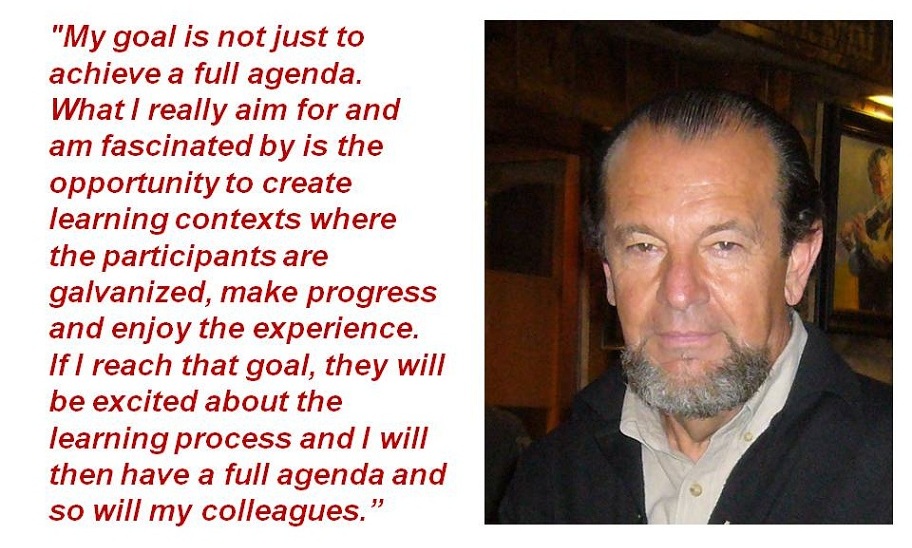

Why do I do this?
It is estimated that only fifteen percent of the population is willing to operate major transformational changes in their habitual behavior through learning new personal and management skills. And some argue that the number who actually carry out resolutely and persistently new habits to progress in these skills is less than five percent.
And yet, if we define the set of skills we refer to as…
…the learned ability to understand and manage your own emotions, understand those of others, and through your own thoughts and emotions and that of others, inspire, transform, motivate and lead, with the best of yourself and others…
… we find that these skills are the most important determinant of successful leadership and success -defining success as the ability to set goals and achieve them- in the personal, professional and organizational life of an individual.

Some evidence
The Rutgers University has prepared a study that brings overwhelming evidence in this regard. Here are some of the conclusions:
- A multinational consultancy found that the performance benefits were 139% higher in those consultants that ranked above an average of 9 out of 20 IE skills (Emotional Intelligence).
- The Air Force has discovered that its most successful staff rate significantly higher than the rest, in such skills as assertiveness, empathy, happiness and emotional self-awareness.
- L ‘Oreal has verified that sales personnel selected on the basis of their emotional competence, have better results than those selected according to the traditional method.
- An Insurance Company discovers that those salespersons with less self-confidence, empathy and initiative, sold considerably less than those with more in those areas.
- The analysis of over 300 senior executives demonstrates that there are six emotional traits that distinguish the best: influence, team management, organizational awareness, self-confidence, achievement and leadership.
- In jobs of medium complexity (sales administrative, mechanic, etc.), those with the best results owe a third of it to acquired skills and cognitive techniques, and two thirds to their emotional intelligence skills.
- Several hundred executives from twelve organizations showed that the ability of self-assessment was associated with better results obtained.
- A chain store associated the stress management ability to the successful top store managers.
- American Express verified that managers who had received training in emotional intelligence achieved higher turnover than the rest.
- Research carried out by the Center for Creative Leadership shows that the main cause of derailment of executives, is an emotional intelligence deficit. The three main causes are difficulty managing change, inability to work well in a team and poor interpersonal relations.
- Supervisors in a manufacturing plant were trained in skills such as listening ability, helping employees resolve problems on their own, resulting in a reduction of accidents and complaints and a significant increase in productivity.
Both empirical observation and research tell us that human “achievement”, rather than the ability to store huge amounts of knowledge, is often more a question of self-awareness, self-discipline, self-motivation, motivating others, and relating well with others…


And yet there has still not been a wide recognition of this reality in our society … although it is true that some great minds in a position to influence are adopting it fully. But while we have made progress in the last ten years, it will take time to incorporate the real consequences of these ‘findings’ in our culture. The establishment (or the powers that be -and which supposedly work in the established order-), are today and as ever, too rigid. On one hand, there’s its inertia and its sluggish reactions. But above all, it fears being ousted by the dangerous currents of the ‘new’, and is reluctant to adopt changes they perceive as threatening to their hard-won privileges.
In the early sixteenth century, as the opponents of the new ideas of Galileo- supporting the Aristotelian theory of geocentrism- started to organize, Sagredo wrote: «The power and generosity of your prince allow the hope that he is able to recognize your dedication and your merit, but in rough seas of today, who can avoid being, I would not say sunk, but at least severely shaken by the fierce winds of jealousy?».
Paradoxically, in the XXI century children will have to wait for their parents, kindergartens and schools to take seriously the importance of learning from an early age to identify their strengths, self-motivation, motivation of others, to empathize, and to negotiate … Young people will have to wait until universities give priority to promoting the self-knowledge ability, auto-discipline, communication, debate, leadership, …
However, organizations of all kinds are in a hurry, as they see clearly that they cannot delay collecting the fruits borne from the skills of their key staff … if they had them. Nor do people, employees, executives and professionals with fine sensitivity have time to waste, those who perceive in the practice of the skills of emotional intelligence, a wise, successful and satisfying growth as a person and as professionals, and the way to obtain sooner and better, ambitious goals ever more proper and genuine.
And these are the people, professionals and organizations ahead of their time, that have led to the emergence in recent years of the figure of the ‘Trainer-Facilitator-Coach’ in Personal and Management Skills. A figure whose task, as of today, appears to be endless…


 .
.

